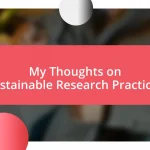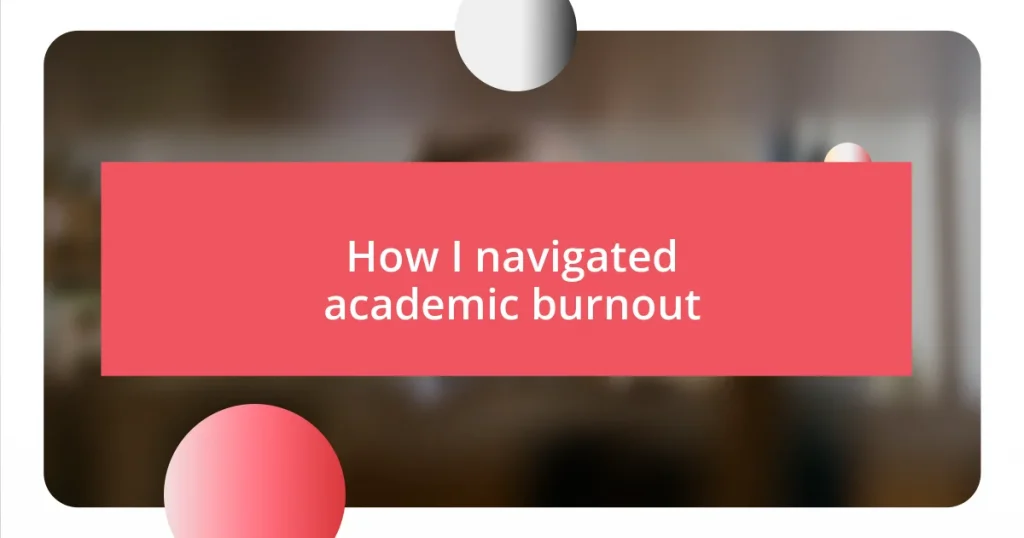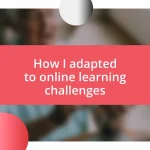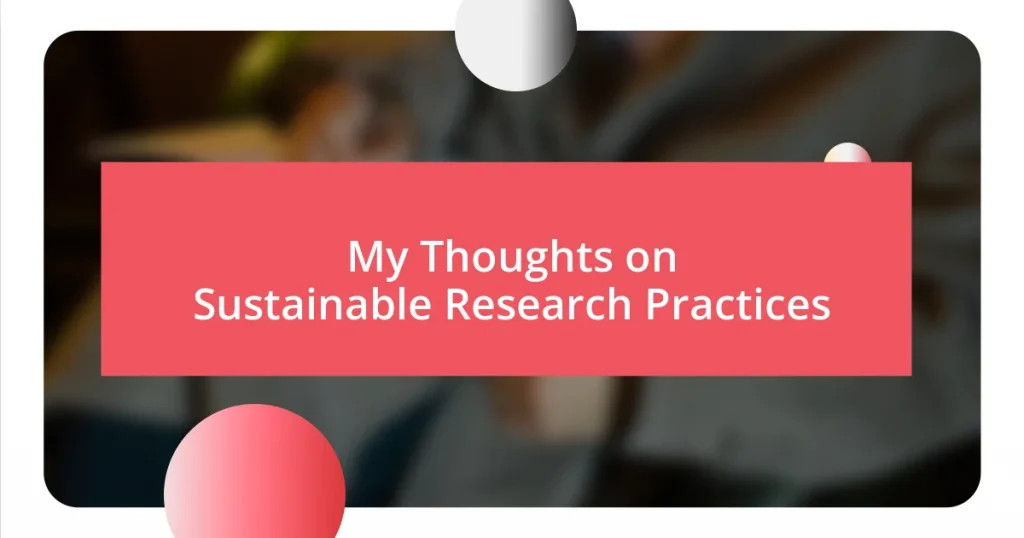Key takeaways:
- Understanding academic burnout involves recognizing its symptoms, such as fatigue, decline in performance, and increased irritability, which signal the need for a break.
- Developing effective coping strategies, including mindfulness, setting boundaries, and seeking peer support, is essential for managing stress and maintaining balance.
- Reflecting on personal growth during challenging times transforms setbacks into learning opportunities, fostering resilience and a positive mindset towards academic challenges.
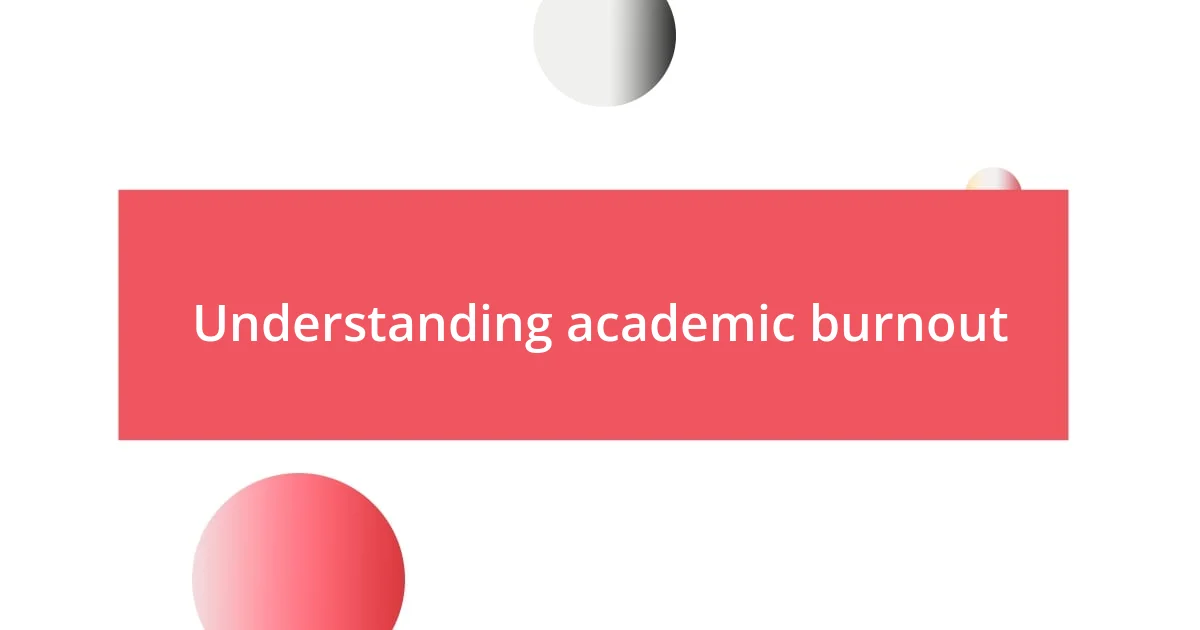
Understanding academic burnout
Academic burnout can feel like a heavy fog settling in, obscuring not just motivation but also clarity of thought. I remember a time when I sat in front of my books, overwhelmed, wondering how I could possibly carry on. Have you ever experienced that paralyzing sensation where even small tasks feel insurmountable?
It’s not just exhaustion; it’s a complex web of stress, anxiety, and feelings of inadequacy. There were nights when I would stare at screens until my eyes felt like they had given up. The pressure to perform consistently while juggling deadlines can make us question our self-worth and ambitions. It’s a struggle that many of us face, but understanding that it’s a common experience can be a relieving realization.
Engaging with this reality requires a deep dive into our emotions. I often found comfort in discussing my feelings with friends, and it was fascinating to discover that they shared similar thoughts. Have you ever opened up about your struggles and found solace in shared experiences? Recognizing academic burnout as a shared challenge can help alleviate feelings of isolation and encourage us to seek solutions together.
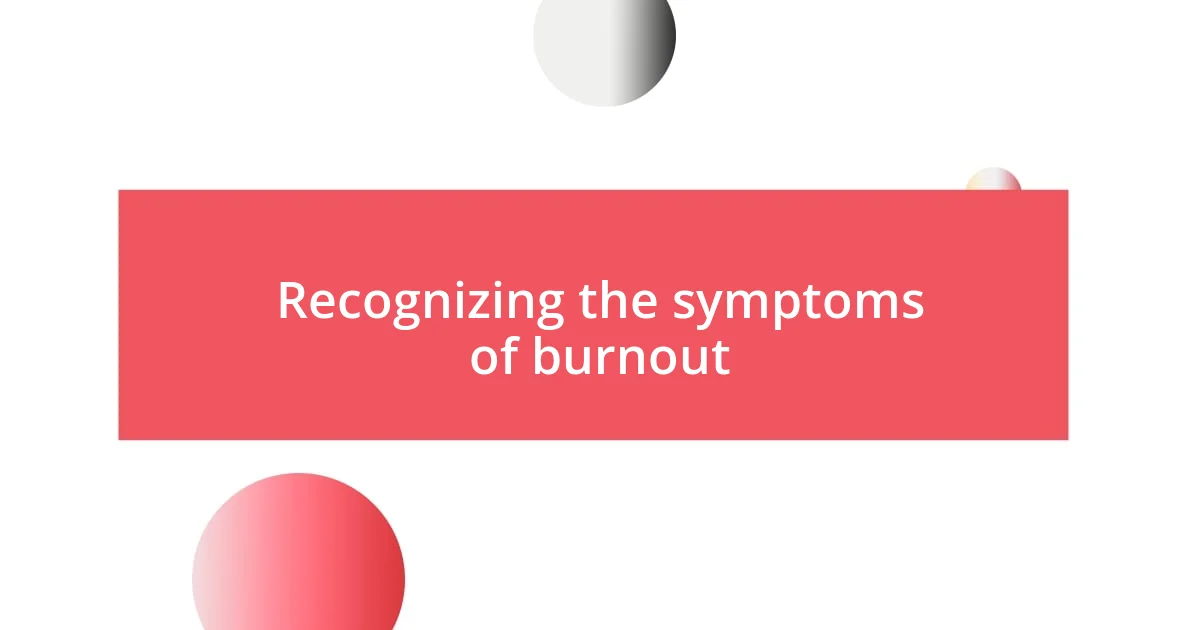
Recognizing the symptoms of burnout
Recognizing the symptoms of burnout can be tricky, especially when you’re caught up in the whirlwind of academic life. Personally, I began to notice subtle shifts in my energy levels—where once I felt vibrant and eager, fatigue crept in like an unwanted guest. Have you ever felt that nagging sense of exhaustion that just wouldn’t shake off, regardless of how many hours you spent resting? It serves as a vital warning sign that our minds and bodies may be signaling for a break.
Another hallmark of burnout is the decline in performance and productivity. I distinctly recall days where I could sit at my desk for hours yet produced very little. It’s as if my brain was running in circles, and no matter how hard I pushed, the finish line seemed to drift further away. This loss of efficiency not only fueled my frustration but also amplified my feelings of inadequacy. Have you experienced moments when you chalked up your struggles to mere laziness, only to realize later it was burnout doing its work?
A key symptom that I often overlooked was my increased irritability and anxiety. I found myself snapping at small things, like forgetting to pack my lunch or missing a deadline, which was not typical for me. It’s so easy to brush off these emotional responses as typical stress, but they were more than just passing moods. They were indicators that I needed to recalibrate my mental health. Have you noticed how emotions can spiral into a deeper state of unrest when burnout takes hold?
| Symptoms of Burnout | Description |
|---|---|
| Fatigue | A constant feeling of exhaustion that doesn’t improve with rest. |
| Decline in Performance | Reduced productivity and efficiency in academic work. |
| Irritability | Increased frustration and anxiety over minor issues. |
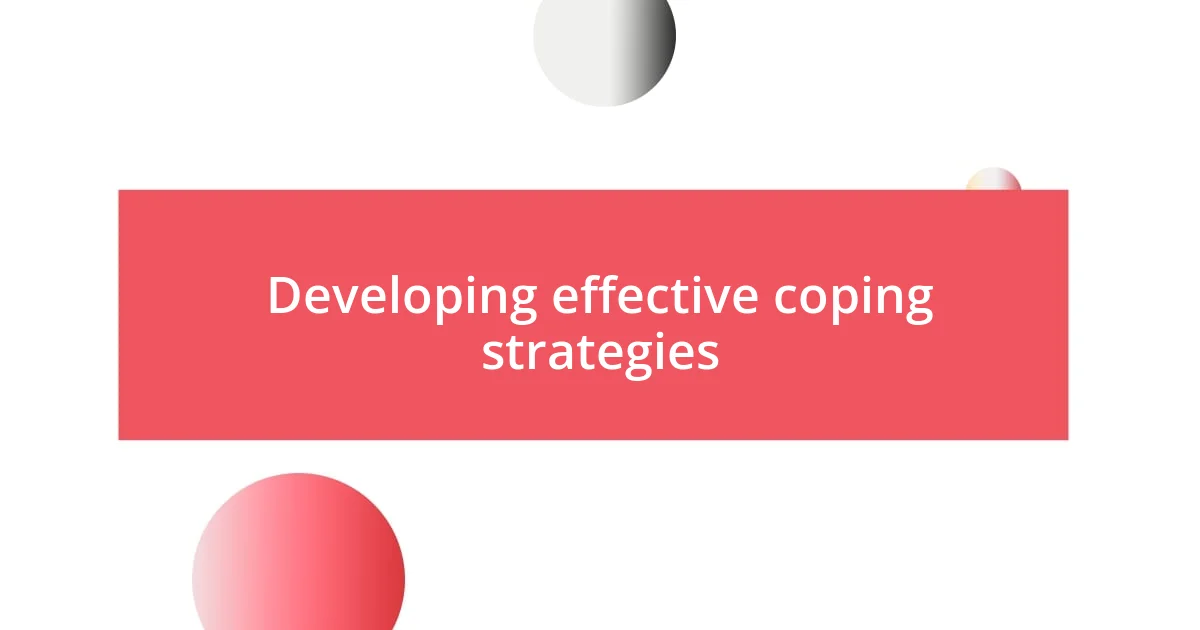
Developing effective coping strategies
Developing effective coping strategies was crucial for me during those overwhelming times. One approach that worked wonders was establishing a structured routine. By carving out specific times for study, relaxation, and social activities, I could create a sense of balance in my life. I vividly remember how it felt to finally disengage from studies at a set time each day, knowing that I would still have time for my hobbies. Have you ever felt that rewarding sense of accomplishment when you’ve finally allowed yourself some personal space?
It’s also important to explore a variety of coping mechanisms. Here are some effective strategies that I found particularly helpful:
- Practice Mindfulness: Taking a few minutes each day to breathe deeply or meditate helped clear my mind and reduce anxiety.
- Set Boundaries: I learned to say no to extra commitments. Protecting my time became a priority.
- Reach Out for Support: Talking with friends or academic mentors provided not only reassurance but also different perspectives that eased my worries.
- Engage in Physical Activity: Whether it was a brisk walk or an online yoga class, moving my body lifted my spirits.
- Limit Screen Time: Taking breaks from screens — especially before bed — helped improve my sleep quality and mental clarity.
Finding what resonates with you is key. I discovered that engaging in creative outlets, like painting or writing, also gave me a sense of joy and clarity. I sometimes wonder how I would have navigated those tough academic moments without these coping strategies in my toolkit.
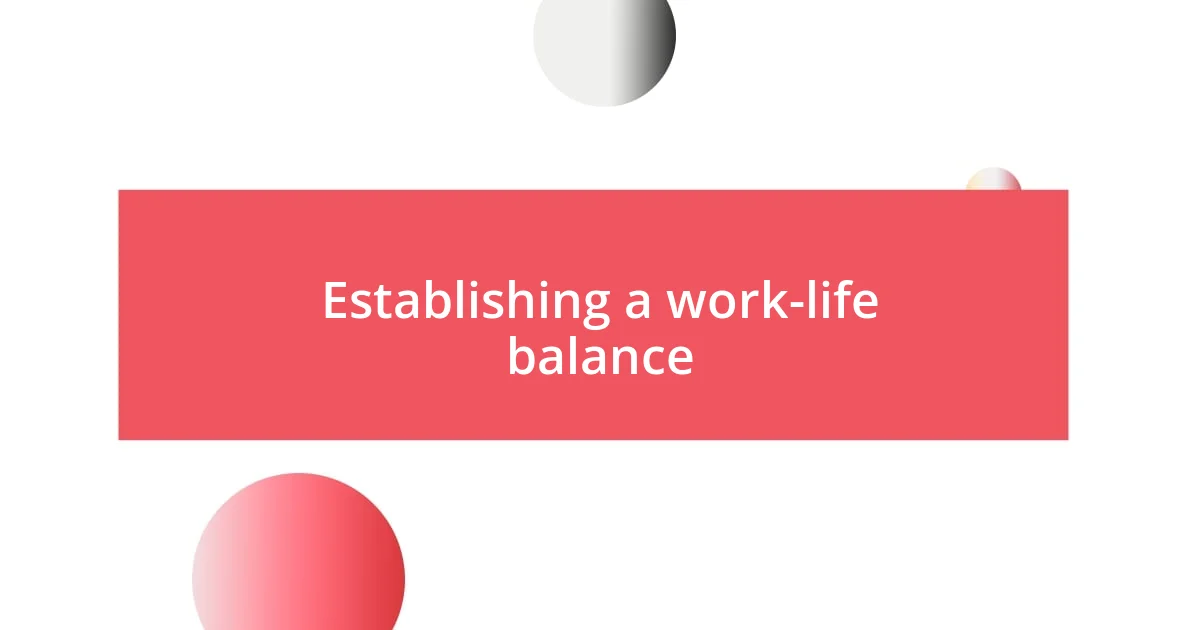
Establishing a work-life balance
Establishing a work-life balance became my personal lifeline amid the chaos of academia. I remember those moments when my to-do list felt insurmountable; I would shift my focus from achievements to self-care. This transition was tough but essential. Have you ever noticed that when you’re constantly hustling, life tends to roll into a blur of responsibilities, leaving little room for joy?
I distinctly found that setting clear boundaries helped me reclaim my time. During the semester, I set a firm “no work” policy on weekends. Initially, it felt daunting, almost as if I were wasting precious study hours, yet the recharge that followed was invaluable. One Sunday afternoon, I spent hours hiking, completely forgetting about assignments—and that’s when I rediscovered my enthusiasm for learning. Isn’t it fascinating how a day spent away from books can reignite your passion for them?
Moreover, I learned the beauty of unscheduled moments. Allowing myself blocks of free time—whether to indulge in a favorite show or simply daydream—helped diminish the stress weighing on my mind. I recall a particularly tough week where I took a spontaneous trip to a nearby café. Sitting there with a warm cup of coffee, I could feel tensions melt away. Have you ever experienced the sheer bliss of stepping back and just being present? It’s in these quiet moments that I found clarity and balance, reinforcing that work is just one part of a fulfilling life.
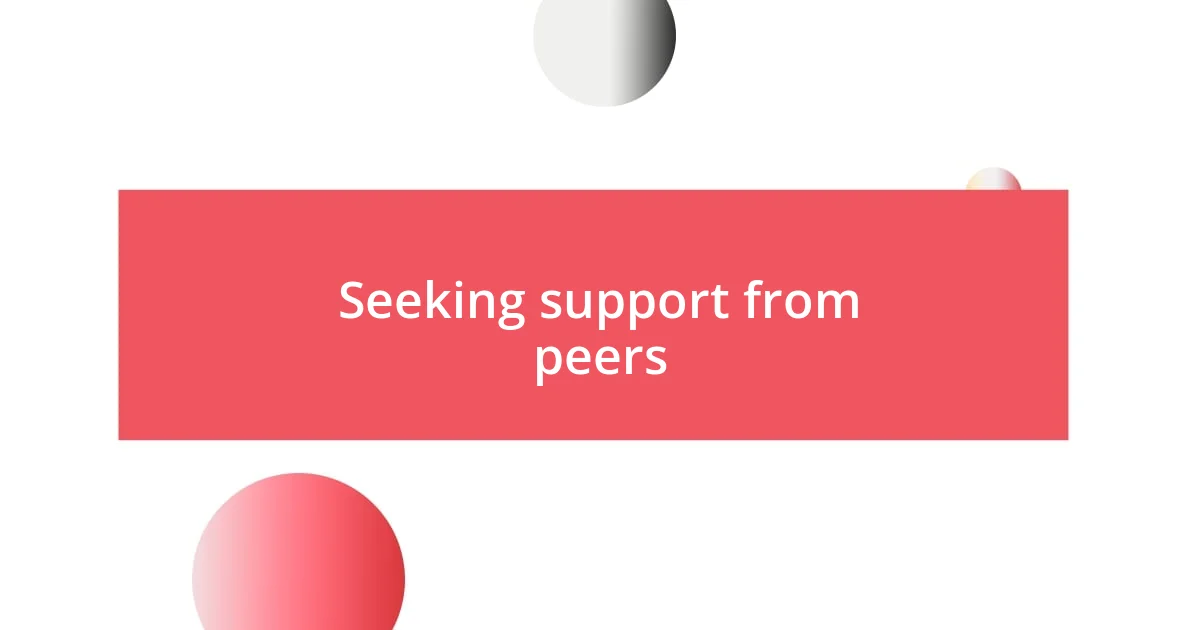
Seeking support from peers
Reaching out to my peers was one of the most transformative steps I took during my battle with academic burnout. I remember sitting in the library, feeling isolated while surrounded by others who were just as stressed. One day, I decided to initiate a group study session with some classmates. The simple act of sharing our struggles opened up a floodgate of support and understanding that I hadn’t anticipated. Have you ever found solace in knowing that others share your burdens?
I was blown away by how discussing our assignments and personal challenges alleviated a lot of pressure. I found that peer support wasn’t just about sharing notes; it was a space where we could vent, commiserate, and lift each other up. There was this one gathering where we all admitted our fears about failing an upcoming exam. After talking it through and sharing tips to tackle tricky subjects, I felt lighter—almost as if the weight I was carrying was halved. Isn’t it incredible how camaraderie can transform a daunting journey into a shared adventure?
The emotional connection I forged with my peers reinforced the importance of community. In those moments, I learned the value of vulnerability; being open about my feelings made it easier for others to do the same. I vividly recall sharing a laugh over an embarrassing mistake during a presentation, which broke the tension and made our group stronger. Have you ever noticed how shared laughter can dissolve anxiety? It was these candid moments that brought genuine joy back into my academic life, reminding me that I wasn’t alone on this rollercoaster ride.
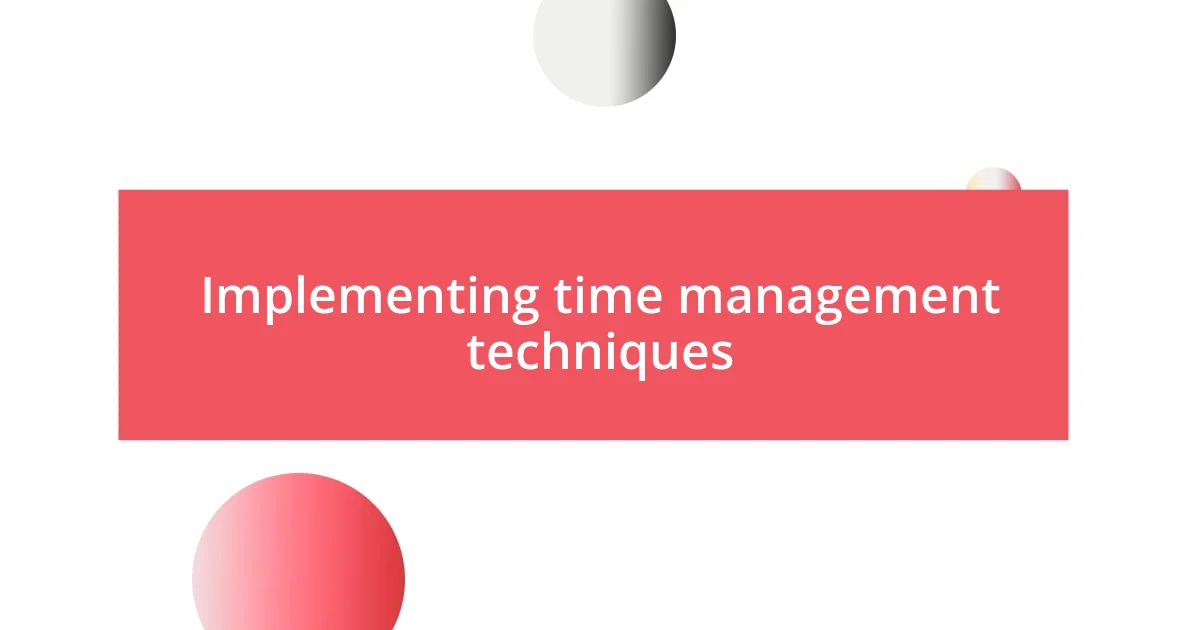
Implementing time management techniques
Implementing effective time management techniques was crucial in my journey through academic burnout. I vividly recall my struggle with prioritizing tasks; it often felt like I was juggling too many balls in the air. One strategy that truly transformed my approach was the Pomodoro Technique. By breaking my study time into focused intervals, I found that short bursts of work followed by quick breaks not only kept me engaged but also made daunting assignments more manageable. Have you ever experienced that moment of clarity when a method clicks, transforming chaos into order?
Another technique I embraced was prioritizing my tasks using a straightforward matrix. I would categorize assignments based on urgency and importance, which helped me focus on what truly mattered each day. This process allowed me to approach my studies with a clearer sense of direction. I still remember that one week when I felt overwhelmed with simultaneous deadlines looming. By mapping out everything, I discovered that some tasks could wait, easing the pressure dramatically. Isn’t it empowering to realize you can take control of your time instead of letting it control you?
Lastly, I discovered the importance of scheduling downtime within my routine. I initially hesitated, thinking every minute must be used for studying, but I learned that my brain needed those breaks for creativity and mental rejuvenation. There were instances when I would map out my week, including time for hobbies like painting or playing guitar. Those moments became my recharge sessions, where inspiration flowed freely, and I returned to my studies refreshed. Have you ever noticed how stepping away can bring fresh insights? It’s this balance of structure and freedom that ultimately helped me thrive, allowing both my academic pursuits and personal passions to coexist harmoniously.
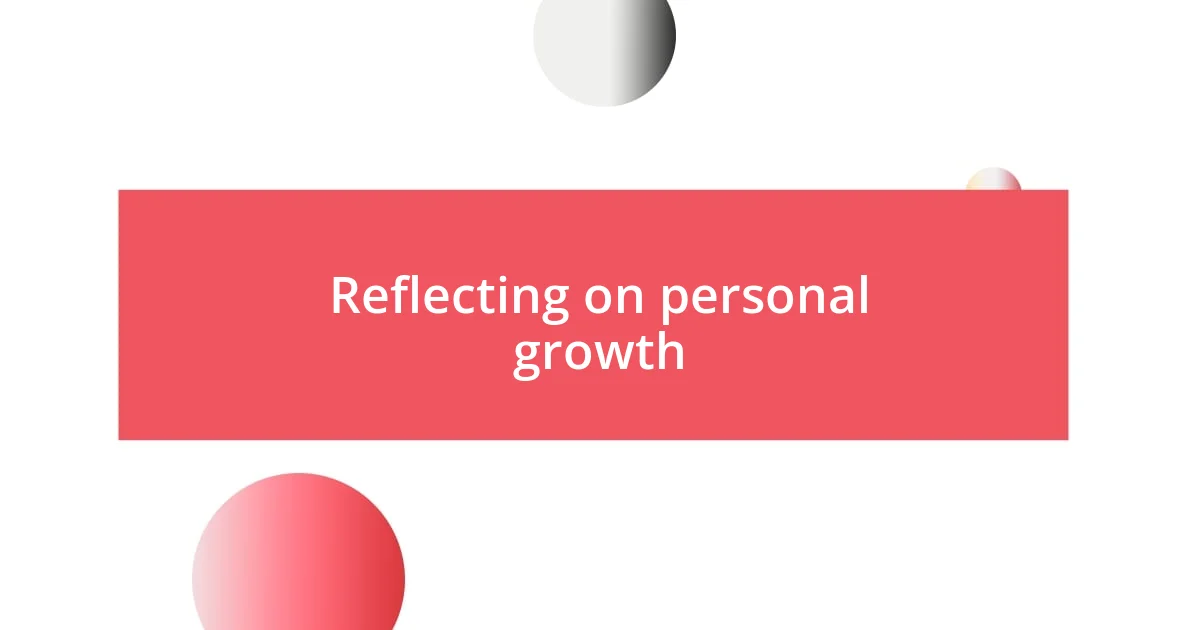
Reflecting on personal growth
Reflecting on my personal growth during this challenging time has been an eye-opening experience. I remember feeling like I was in a fog, unsure of my direction, yet emerging from that haze felt almost liberating. Each step I took, whether big or small, contributed to a newfound resilience that I carry with me today. Have you ever felt like a different person after overcoming a tough period?
It’s fascinating how my perspective shifted throughout this journey. I used to view setbacks as failures, but I now see them as learning opportunities. One evening, after failing a crucial exam, I spent hours questioning my abilities. What surprised me was realizing that my worth isn’t tied solely to grades, but rather to my effort and growth. This revelation marked a turning point, empowering me to embrace challenges with a more positive mindset. Have you ever had an experience that reshaped how you see your potential?
Ultimately, this reflection has taught me that personal growth is an ongoing journey. I cherish moments where I consciously stepped out of my comfort zone, like volunteering to lead a group project. The initial anxiety I felt was overshadowed by the thrill of collaboration and leadership. It’s moments like these that remind me that growth often lies just beyond our fears. When have you taken a risk that led to unexpected personal development?


